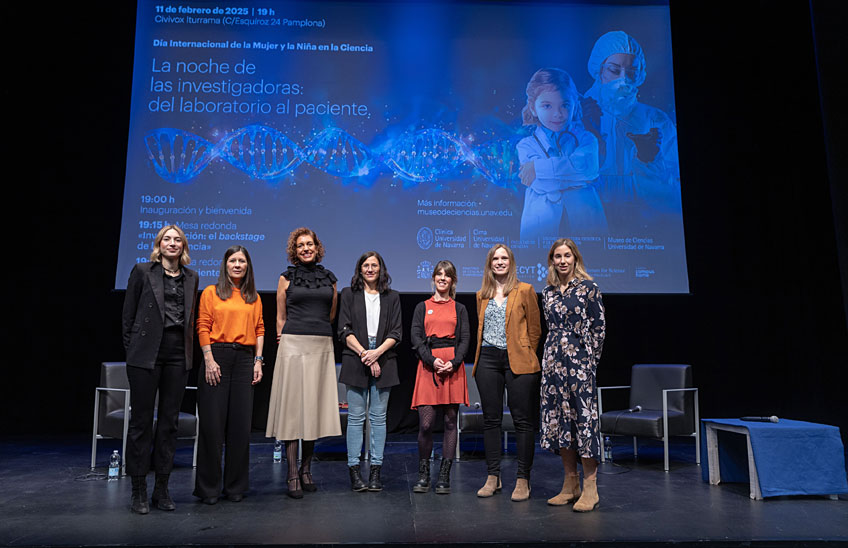La noche de las investigadoras' brings science closer to society, with a focus on oncology and the role of women
Experts from the fields of research, care and pharmaceuticals participated in this event, organized on the occasion of the International Day of Women and Girls in Science, with the aim of bringing this field closer to the general public.

FotoManuelCastells
/From left to right: Inés Ibáñez, Marisa Villafranca, Isabel Carrilero, Marta Montes, Ibone Labiano, Anna Vilalta and Amaya Villanueva before the beginning of the session "La noche de las investigadoras".
12 | 02 | 2025
Science and society came together in"La noche de las investigadoras", a day held at Civivox Iturrama on the occasion of the International Day of Women and Girls in Science, and organized jointly by the Clínica Universidad de Navarra, the Cima, the Faculty of Science and the Science Museum, the Women For Science and Technology group and the UCC+I of the University of Navarra. This edition focused on cancer research and how scientific advances reach patients, highlighting the key role of women in this field.
The event, entitled"From the laboratory to the patient", was structured in two round tables and was moderated by Inés Ibáñez, PhD student of the Medicinal Chemistry Group at Cima, who emphasized that "science is a vocation full of challenges and moments of uncertainty that, in the end, make every achievement worthwhile". She also stressed the need to inspire new generations: "We want to make this integral process visible by giving a face and a voice to many of the women who are leading this effort".
"Research: the backstage of assistance".
The first round table offered an insight into the work in laboratories and how basic research translates into improvements in medical care. Participating in this session were Marta Montes, principal investigator of the Division of DNA and RNA Medicine at Cima; Ibone Labiano, postdoctoral researcher at Navarrabiomed; and Isabel Carrilero, corporate director of R&D at CINFA.
Marta Montes shared how her experience abroad marked a before and after in her research career: "I hardly knew what a laboratory was until I went on an Erasmus program in the Netherlands. There I discovered how fascinating scientific research is". For her part, Isabel Carrilero stressed the importance of collaboration between the pharmaceutical industry and basic research to bring treatments to patients: "The development of a drug takes six years. It is a long process full of challenges, but with a great impact on society". Ibone Labiano also highlighted the need to reduce the barriers faced by women researchers: "We still find many more women in technical and pre-doctoral positions than in scientific leadership positions".
All of them shared their personal experiences and emphasized the importance of collaborative work in biomedical research, of making the role of women in science visible and of awakening vocations from an early age. "If you are interested, any path will lead you to research", concluded the guests.
"Reaching the patient."
The second round table discussed how scientific advances are translated into clinical practice and healthcare. Participants included Dr. Anna Villalta, oncologist at the Cancer Center Clínica Universidad de Navarra; Amaya Villanueva, liaison nurse for clinical trials on the hospital ward of the Clínica Universidad de Navarra; and Marisa Villafranca, psycho-oncologist and head of the Mission Program of the Asociación Española Contra el Cáncer in Navarra. Their interventions provided first-hand knowledge of the importance of advances in bringing clinical trials closer to patients, and support for patients and their families in the cancer treatment process.
Dr. Vilalta pointed out that"immunotherapy has revolutionized oncology, allowing, in some cases, to speak of a cure in advanced tumors". For her part, Amaya Villanueva explained the importance of the role of nursing in situations as complex as that of an oncology patient facing a clinical trial for the first time: "We not only administer the treatment, but we also accompany the patient throughout the process, giving him confidence and support at a time of great uncertainty". Marisa Villafranca emphasized, in turn, the work of the Spanish Association Against Cancer: "When cancer reaches a family, it has an impact on all its members. Our role is to offer emotional and social support to improve their quality of life".
A privileged environment
Navarra has a biomedical ecosystem of reference in which collaboration between research, healthcare and the pharmaceutical industry allows scientific advances to be transferred to society. Initiatives such as "La noche de las investigadoras" not only seek to disseminate knowledge, but also to inspire scientific vocations and encourage the participation of citizens in the advancement of science.
At the end of each of the panels, a question-and-answer session was opened for the audience to interact with the speakers, reinforcing the shared commitment to continue promoting research and its impact on society. The event concluded with an optimistic message about the future of research and the key role of collaboration in science.